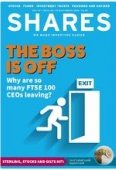Archived article
Please note that tax, investment, pension and ISA rules can change and the information and any views contained in this article may now be inaccurate.
With the pound falling, use this trust to invest overseas in quality companies

At the beginning of September 2022, the Scottish Investment Trust was subsumed into JPMorgan Global Growth & Income (JGGI).
We think this is good news for anyone who has come across from the Scottish Investment Trust and for existing investors in the JPMorgan fund. For those not already invested, now is also a great time to buy shares in the combined entity.
Weakness in sterling has boosted the relative value of global earnings and volatile markets have created opportunities to invest in great businesses at more attractive prices.
THE BACKGROUND
Both trusts can trace their history back to 1887, yet their fortunes have not been the same. The Scottish Investment Trust had underperformed for some time, even lagging when the value investment style came back into faction. In contrast, JPMorgan Global Growth & Income generated strong returns.
The latter comfortably tops the Association of Investment Companies’ Global Equity Income sector over 10 years and over five years it is in a dead heat with Securities Trust of Scotland (STS). Even comparing it to names in the AIC’s Global sector JPMorgan Global Growth & Income only stands behind Scottish Mortgage (SMT) and Lindsell Train (LTI) over the past decade.
Merging it with the Scottish Investment Trust has helped create a vehicle with greater scale – assets are well in excess of £1 billion – and that has resulted in lower costs with an ongoing charge of just 0.53% for the combined entity.
While JPMorgan Global Growth & Income shares a focus on value with the former Scottish Investment Trust, it is not looking for beaten up companies which can recover. Instead, it hunts for quality businesses trading at attractive prices. Shares in the trust itself trade at a modest 3.8% discount to net asset value.
BACKED BY A SKILLED RESEARCH TEAM
Managed by Helge Skibeli, Raj Tanna and Tim Woodhouse the trust typically holds 50 to 60 stocks. The managers are backed by an experienced group of global analysts who track a universe of 2,500 stocks across 19 different sectors.
As Skibeli notes: ‘Our job as portfolio managers is to capture the very best insights and ideas from this highly-skilled research team. We compose the portfolio such that it has a lower price to earnings ratio than the all-company index and a higher expected growth rate. This is a winning combination and something we make sure is always in place in this portfolio.’
The portfolio managers and research analysts have daily calls where they take a detailed look at the sector and stock-specific outlooks for existing holdings and shares which they are thinking about adding to the portfolio. ‘What is unique about the calls is the incredible diversity of backgrounds and perspectives. This always leads to an exchange of information of views and insights which is highly additive to us as global portfolio managers,’ Skibeli comments.
The focus on identifying compelling individual investments rather than concentrating on any specific sector has resulted in a diversified portfolio. The trust is noticeably underweight technology relative to the wider index and continues to avoid highly valued and unprofitable tech businesses.
Tim Woodhouse points out that top holdings like McDonald’s (MCD:NYSE) and American Express (AXP:NYSE) are ‘very well protected’ from inflation because ‘American Express takes a small slice of every transaction and if prices are rising they get to take a larger slice, while McDonald’s is a franchise business so taking a franchise fee without taking much pain from labour costs or food price inflation’.
Woodhouse and Skibeli identify their favourite stocks as Amazon (AMZN:NDQ) and LVMH (LVMH:BIT) respectively.
Amazon is favoured due to what Woodhouse describes as the ‘underappreciated’ duration of growth in the retail and cloud computing businesses, which should enable it to generate free cash flow of $100 billion by 2026.
According to Skibeli, luxury goods firm LVMH offers ‘a long trajectory of secular growth, meaningfully higher than nominal GDP growth for the next decade’ as well as market share gains in different luxury categories and a business model which underpins faster growth in free cash flow than revenue.
As the name of the trust suggests there is also a focus on income. The trust aims to pay a dividend of 4% of its net asset value in four quarterly payments. Because this can be taken out of income and capital the company can maintain its focus on the best investments rather than chasing lower-quality but high-yielding companies.
Important information:
These articles are provided by Shares magazine which is published by AJ Bell Media, a part of AJ Bell. Shares is not written by AJ Bell.
Shares is provided for your general information and use and is not a personal recommendation to invest. It is not intended to be relied upon by you in making or not making any investment decisions. The investments referred to in these articles will not be suitable for all investors. If in doubt please seek appropriate independent financial advice.
Investors acting on the information in these articles do so at their own risk and AJ Bell Media and its staff do not accept liability for losses suffered by investors as a result of their investment decisions.

 magazine
magazine










